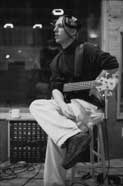| |
|

Q: The
group will perform in Spain for the first time and it’s not known
among local jazz fans. At the outset, I should ask you to introduce
yourselves. When and how was it founded and who are its members...
P.A: Contemporary
jazz ensemble [iks] was founded in July 1996. The musicians' common
desire to experiment with their different approaches to improvised music
and create a new and unique language was at the base of this association.
Members
of [iks] are Pierre Alexandre Tremblay (artistic director, real-time
processing and bass guitar), Sylvain Pohu (guitar), Nicolas Boucher
(piano, sampler and real-time processing), Sean Craig (saxophone) and
Stefan Schneider (drums).
A full bio of each of them is available on the web site: www.iksperience.com
Q: You
have produced four discs and a fifth one
is in the making. In them you talk about rap, soul, and free
jazz... Isn’t it pretentious trying to cover so many styles?
P.A: Not
at all! Jazz is a music of hybridising, open to the world and its many
aspects.
We don’t pretend to master all those styles, but just to like
them and to be influenced by them.
We think that jazz is a music of present tense, which means that
you have to be aware of a maximum of things around you.
Q: For
that work you have drawn inspiration from countries such as Nigeria and
Senegal, and even from European music.
As we understand it, Africa is like the cradle of jazz. Then,
what has motivated you to seek inspiration from those countries,
including Europe?
P.A: The
European vision of Free Jazz is really interesting.
And almost all the great composers of the Western Classical Music
are European!
Q: And
speaking of Africa, your fourth CD (“Le Jounal de Sable”) is the
product of a three months’ stay in Senegal.
From a human stand point, what was that experience like?
P.A: There
is a full length documentary film on that question!
A friend of us came with us in Africa and made a film on that
trip.
It was an overwhelming human and musical experience of 3 months,
in which we learn a lot about cultural differences … and a lot about
humility too!
Q: A
journey through music in a pure state,
which you curiously transform into a complex world of sound and
rhythm.
Is almost like a metaphor between two almost antagonistic worlds:
the (wonderful) simplicity of those who live with the bear minimum in
comparison
to the complexity (and often purely materialistic) western world.
P.A: Yes
and no. Their
world is everything but simple.
Our vision of it from outside puts it really simple, but from
inside, it’s not the same at all…
our world seems much simpler and dumber from their point of view!
It’s the main point we have learn fom that experience, and that
was good for humility:
everything can look simple, but reality is really complex.
Our
music is not more complicated than anything else.
It’s a matter of perception.
Our public generally doesn’t understand everything that is
going on, but they perceive something that touches them, and that’s
the important point about art for me.
Sure, we can sit together and I will analyse with you my score
and music, but like Edgar Varèse said, analysis doesn’t talk about
Music!
Q: In
Senegal you actually even performed.
What was the public’s reaction to your performance there? Is it
possible to tell the differences in how the music is perceived in a
country and its social circumstances?
P.A: Like
everywhere else:
they liked it!
We are truly involved in our music, and that is perceivable by
everyone.
There is no bullshit, so people receive and understand what they
can with their experience of life, independently of their culture.
Q: Your
goals tell us of the intention to achieve a novel and unique language.
However,
is it possible to create something new and totally ignoring what
you have already done? Is the fusion of styles and instruments the only
way to create sounds that are somewhat different?
P.A: The
goal is not to create something unique, but personal.
And since every individual is different, I will put my little
contribution to the whole universe of music.
For your aesthetic question, I think tradition is something that has to
be overviewed, not mastered.
Because to play like John Coltrane took John Coltrane his full
life, so I think it is pretentious to pretend to try to get there in
less than this time!
And there is Miles also, and so on…
A
personal language means that both the writing and the instrumentation
are involved in your artistic decision process, as are all the
experience you had in life.
If you work toward being truly yourself, it can’t do harm!
Q: Trying
to explain music with words is too
difficult. But, imagine that I recommend a friend to buy one of
your records and ... before spending his money he wants to know how it
sounds. What should I tell him?
P.A: People
like to put labels on stuff.
I’ve chosen conteporray jazz because it is open, but if you
prefer a more précis one, I would say: "
post-free-jazz-electro-acoustic-contemporary-groove"
Q: In
addition to being the [IKS]
bass player, founder and artistic director and administrative. How do
you combine administrative tasks and being one of the group’s
musicians?
P.A: It’s
really hard!
Weeks of 90-100 hours of work.
And a wonderful wife to help me with the real life stuff, like
food and sleep.
Q: Projecting
your work in the group to other of your
professional experiences. What activities have you carried out
and what are your main objectives other than those of [IKS]
?
P.A: I’m
presently doing a PH.D. in electroacoustic composition, as well as
producing rap albums and doing some studio sessions.
For me there is only one way to do all this, and I don’t
produce my rap differently than I play bass guitar in [iks<: I try to
be truly and humbly myself.
Q: I
am acquainted with some of Québec’s folk music (La bottine Souriante...).
What is the musical scene of that region as seen by someone who
participates in it?
P.A: " La
bottine"
is a really good ensemble of traditional Quebec (or French Canadian)
music, which is a mix of all the differents cultures of the colons.
Our music seen is probably like yours, invaded by American pop
culture, and locals who want to do the same.
Q: In
the same fashion that “Bowling for Columbine”,
Michael Moore’s exceptional documentary,
shows us the social differences between the “frightened” USA
and the more sociable Canada... can you discern the differences between
Canadian
jazz and what is now created in the US?
P.A: No.
actually, jazz is so open that it is hard to divide by region.
If I try to make it simple, Canada and US are so big that you can
divide them in 3 regions, more east-west than north-south: West Coast,
central and East Coast.
West Coast is cool (Vancouver), central is conservative
(Toronto) and East coast is avant-Garde (Montréal).
That is over simplified but true.
Q: If
you are asked to cite names of artists who interest you, regardless of
the musical style, which names would come to your mind?
P.A: In
alphabetical order, at a glance on my record shelf:
Michel
Chion, John Coltrane, Miles Davis, Dr. Dre, Peter Gabriel, Olivier
Maessian, Meshuggah, José Mercé (with Vicente Amigo), Bernard
Parmegiani, Radiohead, The Roots, Seal, Ravi Shankar, Sting, Edgar Varèse…
Q: Lastly.
Which projects will [IKS]’s
immediate future?
P.A: A
fifth album to be released June 15th.
Canadian and European Tour, than sleep!
Next year we have two big projects : one in duets and one with dancers,
video artists and actors.
Plus a lot of gigs in US and Canada.
Exciting!
Thanks
to
Roberto Barahona and Diego
Sánchez Cascado for their translations.
|
|
|

